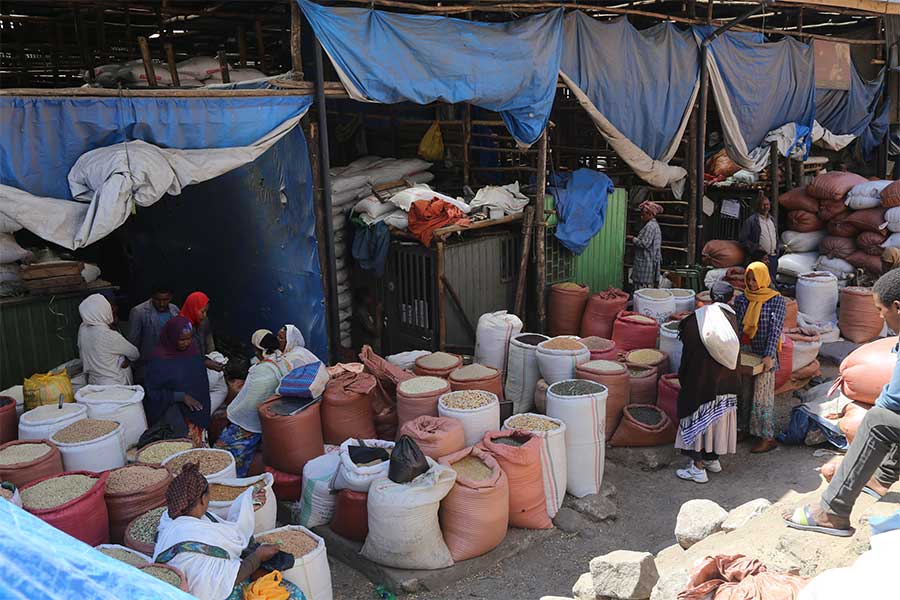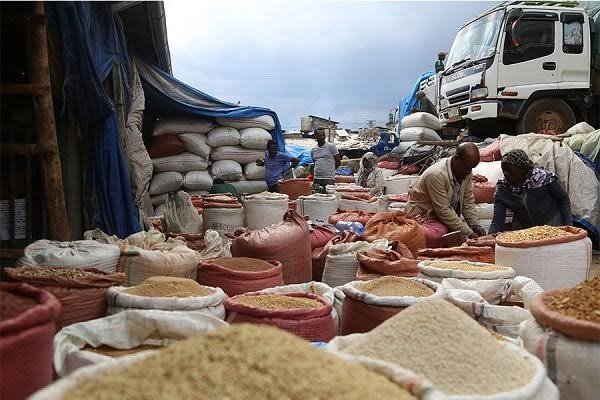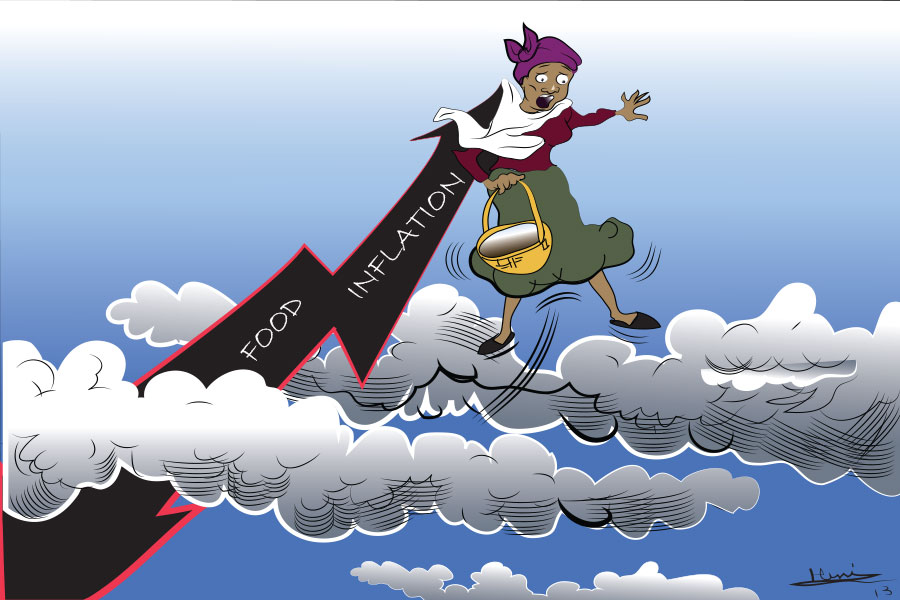
Agenda | Dec 28,2019
Dusty wind blew on the alleyway of Shola Gebeya while the usually lively market seemed rather dreary, on a scorching afternoon last week. Vendors grapple with dwindling sales and skyrocketing costs, as they call out passersby whom they perceive are potential buyers.
Aynalem Nigussie is one of them. Barely shielded from the blazing sun and duststorm with a faded rainbow-coloured umbrella full of wrinkles, the mother of three has a small space in between the shops crammed one after the other.
"I've not sold a single item for two days," she said in a crackling voice.
Aynalem regrets not registering for the condominium housing projects two decades ago. She faces eviction for failing to pay rent for the past three months.
The 100 Br price tag for a kilo of onion has Aynalem frustrated among other costs. With hopes of getting subsidised commodities, she tries to constantly visit the cooperative agencies nearby to no avail. She claims that nearly every item on her minuscule stand has doubled or tripled in price over the past two years.
"Everything has become unaffordable," Aynalem lamented, "We must be cursed or something."
According to data from the central bank, the inflation rate has started to come down to around 27pc since September. However, Alemnesh and many residents of Addis Abeba opt to look at their reality where staple grain Teff which makes its way from conflict-ridden areas, has surged past 100 Br a kilo due to supply chain disruptions. Meanwhile, imported items such as edible oil and sugar have risen in line with foreign exchange rates and international price fluctuations.
Johns Hopkins University economist Steven Hanke recently put the November inflation rate at 60pc. Similarly, an outlook on Ethiopia in the next year and a half put forth by Fitch Ratings forecasts around 15pc drop in early 2024, contingent upon the gradual lowering of the purchasing power of currency.
The inflationary pressure might be an issue of whose numbers one chooses to see. But with millions internally displaced and pushed out of the formal education system, another malaise looms at large —unemployment. The rates in the capital remained over 20pc for the past three years, according to data from the Ethiopian Statistical Services (ESS).
Over the past two years, 55,000 out of the 1.7 million students who sat for university entrance examinations, surpassed the passing threshold. Along with the ones who failed to obtain passing marks for exit exams from the university waddle to unemployment while searching for better opportunities.
Case in point is Jebril Kedir who spends his days scrolling through vacancy posts online. After failing to score acceptable marks to complete his undergraduate studies, the 24-year-old applies for any entry-level position on Indeed, the world's largest job website.
However, he was able to secure an interview for only two openings. As he prepared to retake the exit exams in two months, he is pinning his hopes on jobs in Dubai, learning that the affluent Middle Eastern country is looking for international workers.
"I don't see much hope here," he told Fortune.
Although a plan to create 3.1 million new jobs within the current fiscal year was laid out by the government, the proliferation of conflict in several regional states and the tight monetary policy currently employed paints a grim picture of its implementation.
Central to the plan is availing Technical & Vocational Education & Training (TVET) programs to accommodate 600,000 students a year. Tasked with the essential role, Ministry of Labour & Skills officials outlined trajectories that job seekers seem to lack the necessary skill set despite the prevalent demand.
State Minister for Labor & Skills Nigussu Tilahun recognised the persistent mismatch of labour demand and supply during a partnership deal with the Association for Talent Development (ATD) last week.
"Unemployment is a serious problem," he said.
The sentiment was echoed by Teshome Lemma, senior advisor at the Ministry.
"There is a broken chain for skill acquisition," he told Fortune, stressing the importance of soft skills training and technical capacity to bring forth a vibrant labour market.
He revealed an orientation in secondary school education of incorporating vocational skills to curb the unemployment rate in the long term while acknowledging "The best way to foster skills is through exposure at the workplace."
Economists argue that Ethiopia's current state is better described by stagflation —a combination of high inflation and unemployment rate. The term became common in economic discourse in the mid-1970s; while originally coined by British economists of the prior decade, the supply shock in oil as OPEC placed an embargo on production.
Neither inflation rates nor unemployment ever crossed the double-digit threshold during the period, a stark contrast to Ethiopia, which has consistently experienced over 25pc inflation for the past few years. While most figures on Ethiopia's unemployment rate suggest a single-digit figure, local economists often point out that the numbers only take the skilled labour force into account.
Researcher and economist Arega Shumete (PhD) sees no reason not to characterise the economic situation in Ethiopia as stagflation. He argues that the five percent national unemployment rate stated by the government does not include data from the agricultural sector.
"Stagflation has been a reality for quite some time," he told Fortune.
Arega explains that the Ethiopian economy has been skewed from the typical business cycle for about two decades, only worsening in the last decade due to a series of supply shocks. He stresses the importance of balancing the attention in tightening the monetary policy with a compensatory approach of easing off interest rates for some sectors like agriculture.
He cautions: "Cooling down one issue should not heat another one."
Urban areas like Addis Abeba, which are net buyers of food items and host millions of citizens, experience the harshest of the inflationary and unemployment blows.
To tame the raging beast, the city Trade Bureau officials are aggressively expanding Sunday markets, which supply goods at prices that are around 20pc less than the local market. The Bureau has provided 122,000qtl of fruits and vegetables and above 140,000qtls of cereal grains through its 1.4 billion Br revolving fund to curtail the galloping inflation rate.
"Inflation is the number one problem in the capital," said Sewnet Ayele, communication director of the Bureau.
He acknowledged the delivery of sugar and edible oil has been facing difficulties due to gaps in oversight over 172 cooperative agencies. According to Sewnet, service reform will change the game as a digital distribution program piloted in the Kolfe Qeranyo district is set to become standard across the city.
Sewnet pointed to the reopening of Sheger Bread, a bread production mechanism in which the city administration subsidises 1.55 Br from each loaf, as another notable stride in addressing inflation. He is convinced that unveiling five agricultural market centres opened at the city's entry corridors will relieve some of the pressure on the double-digit inflation rate.
"We're also enhancing regulation for traders," he said, revealing that 7,200 shops have been ceased in the last three months for alleged hoarding of inventory.
Two weeks ago, Mamo Mihretu, governor of the central bank, revealed an ambitious plan to bring down inflation rates to 10pc by next year through a cocktail of monetary policy instruments marked by tightening the money supply. The plan rests on capping credit growth at 14pc, increasing emergency lending rates to commercial banks and the 75pc reduction of direct advances to government.
Venerated economists such as Atlaw Alemu (PhD) stress that any significant curtailment of the country's economic woes rests on the implementation of policy much more than its formulation. He agrees with the characterisation of the Ethiopian economy as stagflationary, and notes the rarity of the circumstances, pointing to the exceptionalism of the Ethiopian economy over the past few years, which has faced unique supply chain problems.
"Tackling inflation is the better of the two evils," Atlaw told Fortune, pushing at lower inflation rates at the cost of some employment.
He explained the tight monetary policy approach over the next two years might lessen inflation caused by excess money supply but will also worsen unemployment as credit becomes rare and employers require a smaller labour force.
"What good is employment if you can't afford to buy something?" Atlaw said.
PUBLISHED ON
Dec 09,2023 [ VOL
24 , NO
1232]

Agenda | Dec 28,2019

Fortune News | Aug 04,2024


Commentaries | Jun 15,2024

Fortune News | Jun 15,2025

Commentaries | Feb 19,2022

In-Picture | Mar 02,2024

Agenda | Feb 04,2023

Agenda | Mar 11,2023

Editorial | Jul 24,2021

Dec 22 , 2024 . By TIZITA SHEWAFERAW
Charged with transforming colossal state-owned enterprises into modern and competitiv...

Aug 18 , 2024 . By AKSAH ITALO
Although predictable Yonas Zerihun's job in the ride-hailing service is not immune to...

Jul 28 , 2024 . By TIZITA SHEWAFERAW
Unhabitual, perhaps too many, Samuel Gebreyohannes, 38, used to occasionally enjoy a couple of beers at breakfast. However, he recently swit...

Jul 13 , 2024 . By AKSAH ITALO
Investors who rely on tractors, trucks, and field vehicles for commuting, transporting commodities, and f...

Oct 11 , 2025
Ladislas Farago, a roving Associated Press (AP) correspondent, arrived in Ethiopia in...

Oct 4 , 2025
Eyob Tekalegn (PhD) had been in the Governor's chair for only weeks when, on Septembe...

Sep 27 , 2025
Four years into an experiment with “shock therapy” in education, the national moo...

Sep 20 , 2025
Getachew Reda's return to the national stage was always going to stir attention. Once...